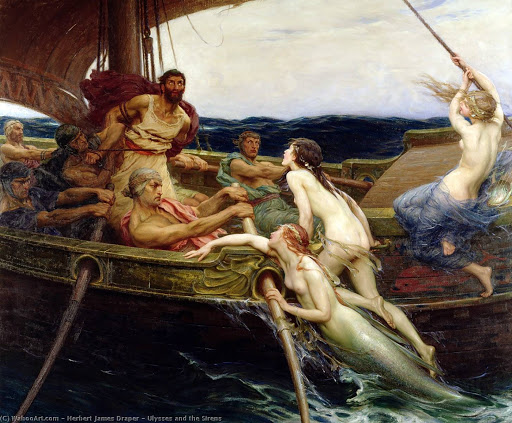
Reader Letitia Grimes sent me the following thoughtful response to an essay where I argued that Odysseus’s monsters represent the emasculation fears of a warrior culture. Working from Freud’s notion of the uncanny, I noted that repressing our fears renders them monstrous.
Greek warriors feared becoming soft and so imagined monsters as either castrating women or island enchantresses who distract men from their mission. The six-head Scylla, who lives in a cage and snatches men from ships, has been described as a toothed vagina, while Circe turns men into swine.
In Freud’s pessimistic vision, we are forever trapped by our psychoses and can do no more than manage them. His student and colleague Carl Jung was more hopeful and described life journeys in which we can confront and overcome our monsters, thereby achieving integration or individuation. Freud and Jung’s disagreement over, essentially, whether life can have such a happy ending contributed to their bitter break-up.
Anyway, Letitia prefers a Jungian reading of the monsters. What if, she suggests, the island enchantresses
are initiatory experiences for Odysseus, preparing him to return home with a more integrated psyche? I’m thinking here of the Jungian principle of integrating discarded parts of the psyche – in the case of a man, to encounter and integrate his feminine side? Thus, the goddesses would not be merely fertility symbols and would not necessarily threaten his masculinity. They challenge him to hold a steadfast purpose and at the same time help him to achieve it.
Letitia points out that women “also need an inner masculine to hold a steady course and can also use the counsel of the goddesses.”
I like the observation because it gets me to look at dimensions of Circe and Calypso that I overlooked. Although they don’t initially want him to leave (especially Calypso), in the end they aid him on his quest. Calypso, heeding the orders of Zeus, provides Odysseus with supplies he needs for his journey, while Circe sends him to the underworld, where the prophet Teiresias helps him return home. In other words, the enchantresses function as threshold guardians, which Jung-disciple Joseph Campbell says transform from impediments to helpers once the hero resolves to heed the call.
In my post, I noted that I had difficulty understanding the Sirens, who (unlike Calypso and Circe) offer not sensual temptation but total knowledge. Circe informs Odysseus that “[a]round them lie/ great heaps of men, flesh rotting from their bones,/ their skin all shriveled up.” Here’s their song:
Odysseus! Come here! You are well-known
from many stories! Glory of the Greeks!
Now stop your ship and listen to our voices.
All those who pass this way hear honeyed song,
poured from our mouths. The music brings them joy,
and they go on their way with greater knowledge,
since we know everything the Greeks and Trojans
suffered in Troy, by gods' will; and we know
whatever happens anywhere on earth."
Letitia offers this wonderful observation:
Regarding the Sirens, I recognized immediately why they offer Odysseus knowledge – I know them well! I’ve heard their modern sisters singing on the Internet, promising instant knowledge and amazing discoveries, luring my attention into the shoals of total distraction. Their victims can be seen scattered everywhere, following the Sirens’ irresistible voices on tiny screens, oblivious to everything else. But they can teach us (after bitter experience) to use the precious gift of discernment.
Letitia follows this up with a wonderful and illuminating passage from Loren Eiseley’s The Unexpected Universe, found in the chapter “The Ghost Continent”:
By contrast, Circe, the great enchantress, says coolly to Odysseus, “There is a mind in you no magic will work on.” That remark, however, is two-edged. It is circumspect, as one great lord of thought might speak to another. It hints at the dawn in the Greek mind of that intelligence which we of this age choose to call scientific. Nevertheless, beneath the complimentary words can be sensed a veiled warning. For the man whom no magic will charm may, in the end, find himself, by means of a darker sorcery, upon a shore as desolate as that which Odysseus narrowly escaped in passing the Isle of the Sirens. The Sirens had sung sweetly to him of all knowledge, while about them lay dead men’s bones. If living for the day and the senses is the folly of the thoughtless, so also is there danger in that insatiable hunger for power which besets the human intellect. Far more than modern men, Homer is wary of that vaulting pride the Greeks called hubris, which is an affront to the immortal gods.”
Letitia adds,
Although written over fifty years ago (Eiseley died in 1977), his words have a prophetic resonance with the 21st century dilemma of god-like technological power accompanied by ecological destruction. Like the Sirens of the ancient seas, their modern counterparts can warn us when we are approaching the regions of hubris.
What Odysseus gains in control (“Don’t you ever get tired of saying ‘Onward”? Margaret Atwood’s Circe says to Odysseus), he loses in a connection with the natural world. Significantly, it is Circe who tells him how to resist the Sirens.
As I watch Donald Trump’s all-out-war on the natural environment, all in the name of corporate profits, I see new monsters arising. The Homeric female monsters that await the Greeks when they seek to dominate are alive and well in the psyche of Trump and his followers (“Lock her up!”). Whereas if we work in conjunction with the goddesses, as Odysseus works with Calypso, Circe, and above all Athena, we will restore health and order to our kingdom.
Dream of the day when a union of Odysseus and Penelope overcomes the rapacious greed of the swine-like suitors.

